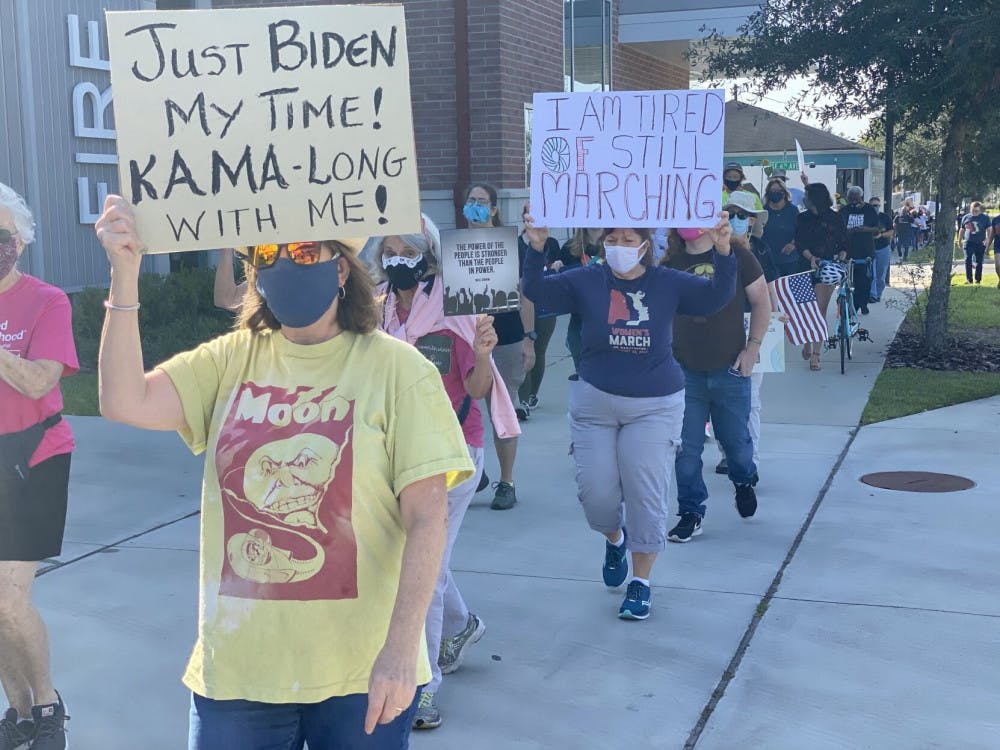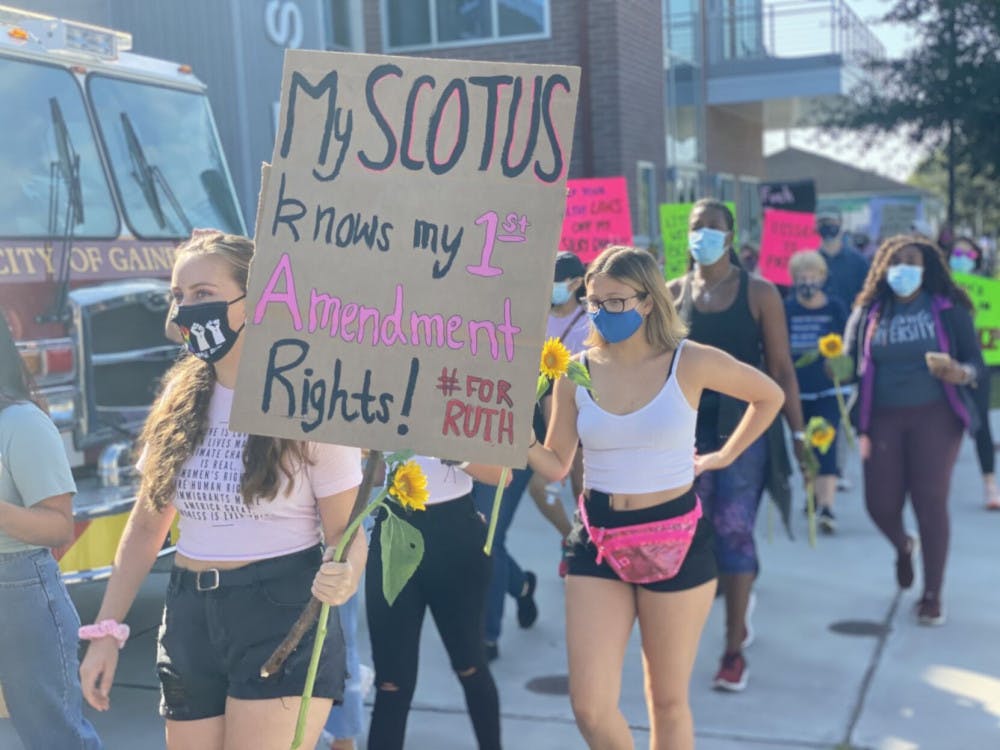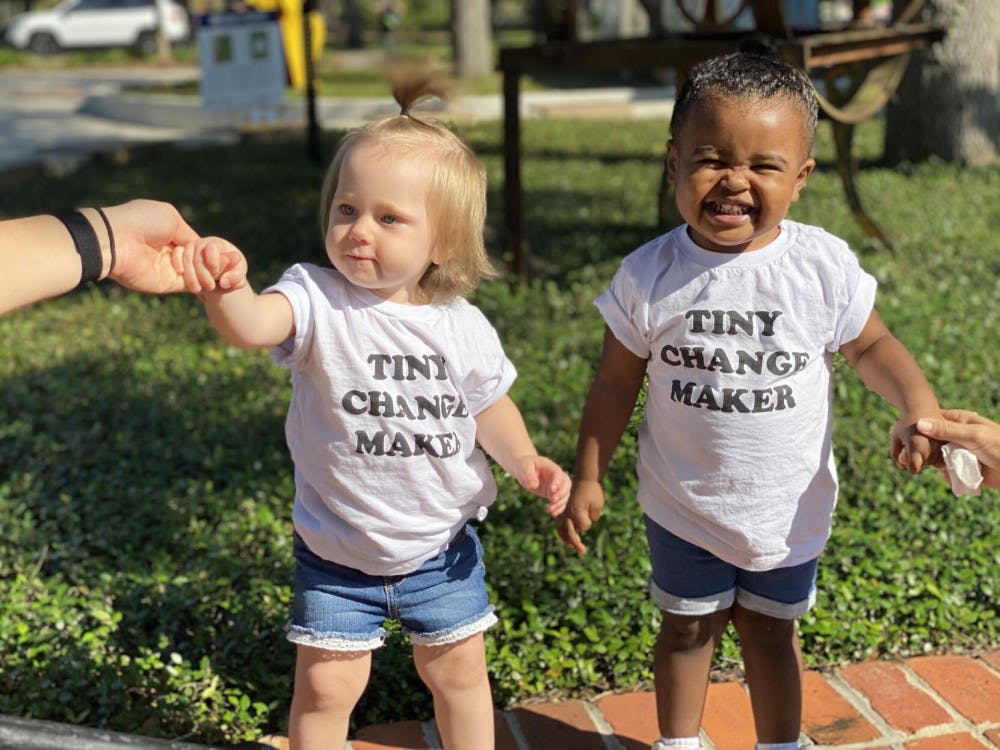
Marchers carry signs with messages such as “Just Biden my time! Kama-long with me!” and “I am tired of still marching” in support of Democratic presidential nominee Joe Biden and vice presidential nominee Kamala Harris.
“May her memory be a revolution,” one sign read. “Men of quality do not fear equality,” another said, held by a man in the crowd, protesting to support the women in his life.
More than 150 masked protesters marched down Main Street and University Avenue from Depot Park to Bo Diddley Plaza Saturday morning during the Gainesville Women’s March.
The event, organized by Larah Doyle, a 30-year-old academic advisor at the UF Warrington College of Business, was intended to be a peaceful protest against attacks from the Trump administration on the rights of all women — including transgender women and women of color.
“They don’t listen when we ask, they don’t listen when we demand, they don’t listen when we have protests or rallies or marches,” Doyle said. “But this march is not for them. It is for us to listen to one another; to encourage one another.”
Protesters were asked by organizers to keep masks on at all times, and crowds kept to this rule, sporting eye-catching masks with messages written on them like “Vote” and “Together we rise.” The social distancing rule of maintaining a six feet distance was mostly followed when marchers arrived at Bo Diddley Plaza as speakers from the community took the stage to galvanize the crowd.
This protest follows a chain of similar demonstrations dating back to 2017, when the inauguration of President Donald Trump sparked Women’s March protests around the globe, including the march in Washington D.C., the most well-attended day-long protest in U.S. history.
Women’s March protests around the U.S. were held Saturday to honor the late Supreme Court Justice Ruth Bader Ginsburg and to protest the confirmation hearings of Supreme Court nominee Amy Coney Barrett. Gainesville’s protest echoed this sentiment.

Amanda Foreman, a 19-year-old UF animal sciences sophomore, marches alongside Alachua County protesters down Main St. to Bo Diddley Plaza.
Amanda Foreman, a 19-year-old UF animal sciences sophomore, held a sign that read “My SCOTUS knows my 1st Amendment Rights! #ForRuth,” in reference to Barrett forgetting to name the right to protest when asked to list First Amendment rights during her Senate confirmation hearing last week.
“I don’t know if I can stand another four years,” she said. “My reproductive rights, my rights as a woman, and just the overall representation of women in American society are at stake.”
In Florida, abortions are legal. However, in September, restrictions were put in place such as the requirement to notify the parent of a minor and for women to have an ultrasound. The Trump administration has historically been anti-abortion. It tried to repeal an FDA restriction on medication for early abortion in Sept. 2020.
Protesters left Depot Park holding sunflowers as Melissa Muller, the 30-year-old manager of Swallowtail Farms, distributed her freshly-cut extras. Swallowtail Farms grows sustainable food and flowers in the City of Alachua.
Muller was just planning to hand out flowers to passersby, but when she found out about the march, she said it seemed like fate. In 2017, she and other Swallowtail farmers travelled to Washington D.C. to attend the Women’s March.
“It was ethereal...” she said. “It was the most amazing thing to be with all these like-minded people.”
Stevie VanAusdale, a 30-year-old UF doctoral student with a focus in counselor education and supervision and therapist at the UF Counseling and Wellness Center, brought her two daughters, two-year-old Aria and one-year-old Maya whose shirts read “Tiny Changemaker”. The two sisters shared a miniature sign that featured a notable quote from Kamala Harris at the 2020 Vice Presidential Debate: “I’m speaking.”
VanAusdale emphasized the importance of putting mental health first, but acknowledged the challenges associated with doing so as the rights of minorities are continually under attack by politicians and policymakers. On stage, she shared her experience as a mother with postpartum anxiety.

Stevie VanAusdale, a 30-year-old UF PhD student and mental health professional who spoke at the rally, brought her two daughters, two-year-old Aria and one-year-old Maya whose shirts read “Tiny Changemaker.”
“In these last two years becoming a mother of two, one through adoption and one through birth, it has opened my eyes to the lack of care for women that have had children,” she said. “We are expected to be the emotional support for our family and our loved ones — that’s a heavy weight and a huge responsibility.”
Karen Bethel, a 51-year-old Alachua County Public School administrator, spoke to the crowd about systemic racism and sexism in the Alachua County Public School system. She mentioned Alachua County’s high achievement gap between white students and students of color, and called to the crowd to help uplift young women and children of color in education.
“I love what I do. I love the school board that I work for,” she said. “But Houston, we have some problems.”

Alan Halaly is a third-year journalism major and the Spring 2023 Editor-in-Chief of The Alligator. He's previously served as Engagement Managing Editor, Metro Editor and Photo Editor. Alan has also held internships with the Miami New Times and The Daily Beast, and spent his first two semesters in college on The Alligator’s Metro desk covering city and county affairs.

Sofia is a news assistant on The Alligator's university desk. This is her second semester at paper, where she previously worked as a translator for El Caimán.





